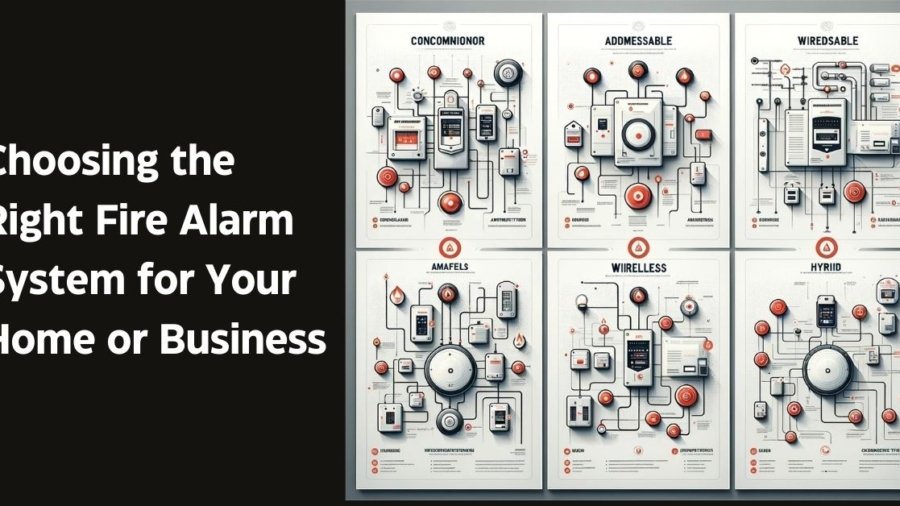Explore the different types of fire alarm systems available for homes and businesses. Learn how to choose the right system to ensure safety and compliance. Choosing the right fire alarm system is crucial for the safety and security of both residential and commercial properties. With a variety of systems available, each suited to different types of buildings and requirements, selecting the best fit can be a daunting task. This comprehensive guide will help you understand the various fire alarm systems, their distinct features, and provide insights on how to select the ideal one for your property.
Understanding Fire Alarm Systems
Before diving into the types of fire alarm systems, it’s important to understand what a fire alarm system is and why it is essential. A fire alarm system is a set of electronic devices working together to detect and alert people through visual and audio appliances when smoke/fire is present. These alarms may include sirens, bells, and flashing lights. Fire alarms are crucial in protecting lives and property by providing early warnings so that people can safely evacuate and emergency services can be called.
Types of Fire Alarm Systems
Before choosing right fire alarm system you should know about the types of alarm system:
- Conventional Fire Alarm Systems
- Overview: Conventional systems are one of the oldest and most basic types of fire alarm configurations. They are best suited for smaller properties, like individual homes or small retail shops.
- How They Work: These systems are organized into several zones, each wired to the main control panel. When a fire is detected, the system triggers an alarm in that particular zone, helping narrow down the affected area.
- Benefits: They are less expensive and simpler to install than more complex systems. Their simplicity makes them reliable and easy to maintain.
- Drawbacks: They do not offer precise information about the location of the fire, only the zone, which can be a limitation in larger areas.
- Addressable Fire Alarm Systems
- Overview: These are more advanced and suitable for larger premises such as office buildings, schools, and large complexes.
- How They Work: Each alarm device within the system has a unique address. When a fire is detected, the device’s address appears on the control panel, pinpointing the exact location of the alarm.
- Benefits: Enhanced diagnostic and monitoring capabilities, which reduce false alarms and improve the speed of emergency response.
- Drawbacks: The system is more expensive than conventional ones and can be complex to install and program.
- Wireless Fire Alarm Systems
- Overview: An excellent choice for buildings where wiring installations are not feasible or where aesthetic integrity must be maintained.
- How They Work: Wireless systems use secure radio communications to connect sensors and alarms to the control panel. They are similar in function to addressable systems but without the need for physical cables.
- Benefits: They offer flexibility in installation and minimal disruption to the building’s structure. Ideal for historical buildings or offices that require a clean, wire-free environment.
- Drawbacks: These systems can be costly due to the technology involved and may require more frequent maintenance, such as battery changes.
- Hybrid Fire Alarm Systems
- Overview: These systems combine both wired and wireless technologies, offering a versatile solution tailored to mixed-environment buildings.
- How They Work: Hybrid systems integrate conventional, addressable, and wireless components, allowing for a customizable approach depending on the specific needs and constraints of the property.
- Benefits: They provide a balance between cost-efficiency and flexibility, suitable for expansions or upgrades from an existing system.
- Drawbacks: The complexity of combining different technologies can increase the difficulty of installation and maintenance.
Choosing the Right Fire Alarm System System for Your Needs
- Property Assessment: Evaluate the size and layout of your property. Larger buildings may require more advanced systems like addressable or hybrid systems to ensure comprehensive coverage.
- Compliance and Standards: Check local fire safety codes and insurance requirements to determine the necessary system specifications.
- Budget Considerations: Consider both the initial installation costs and long-term maintenance. While more sophisticated systems are more expensive upfront, they may offer savings through better functionality and fewer false alarms.
- Consult Professionals: Hiring a fire safety professional can provide valuable advice tailored to your specific circumstances, helping ensure that your system is effective and compliant.
Choosing right fire alarm system is a critical decision that impacts the safety of individuals and the security of property. By understanding the different types of systems and considering your specific needs, you can select a fire alarm system that provides reliable protection and peace of mind. Remember, investing in a quality fire alarm system not only safeguards lives but also protects your property investment in the long run.
Read more blogs. By Fire alarm system in UAE A2z Security Trading. Buy an Alarm system in Kigali, Rwanda.

